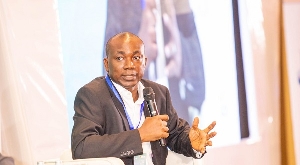 File photo of Ghanaian economist, Prof Godfred Alufar Bokpin.
File photo of Ghanaian economist, Prof Godfred Alufar Bokpin.
Ghanaian economist, Professor Godfred Alufar Bokpin, has questioned the National Democratic Congress’ (NDC) capacity for the much touted 24-Hour Economy promise to Ghanaians, arguing that it is unrealistic given the ongoing energy sector struggles.
Prof Bokpin noted that the country is already grappling with sustaining a reliable eight-hour energy cycle, making an expansion to a 24-Hour Economy impractical under current conditions.
“You are not even getting power for your eight-hour economy cycle that we are running, and you are talking about a 24-Hour Economy,” he remarked.
According to a report by adomonline.com on May 19, 2025, he identified Ghana’s energy sector as a significant threat to economic stability, pointing to systemic inefficiencies within the Electricity Company of Ghana (ECG), including distribution losses of nearly 40% – a figure that he said is almost three times the global average.
“That is not sustainable. Even at 15%, losses are excessively high. With such inefficiencies, realistic pricing becomes nearly impossible,” he explained.
Prof Bokpin also highlighted collection losses estimated at approximately 15% and criticised the failure of some government ministries, departments, and agencies to pay for electricity usage. He described these technical and financial inefficiencies as major obstacles to progress in the power sector.
He also highlighted public concerns over questionable electricity usage by certain state institutions, stressing the need for greater accountability.
Despite these challenges, political promises continue, often disregarding the structural weaknesses within the sector.
“That’s why I don’t understand the upbeat tone from the government. Here you have a government talking about a 24-Hour Economy, yet we are struggling to run an eight-hour one,” he added.
Prof Bokpin called for private sector involvement in ECG’s distribution and billing processes—not through full privatisation, but by injecting capital and operational efficiency.
“The government can remain the sole shareholder, but we should allow the private sector to participate in power distribution and revenue collection,” he suggested.
He noted that these reforms align with Ghana’s ongoing IMF-supported program, which includes structural targets the government must meet. A cabinet decision on ECG’s future is expected soon.
Prof Bokpin warned that unless the government tackles the underlying challenges in the energy sector, ambitious policy slogans like the 24-hour economy will remain mere rhetoric, lacking practical foundation.
MRA/VPO
Meanwhile, watch GhanaWeb’s tour of Odweanoma Paragliding Field below:
